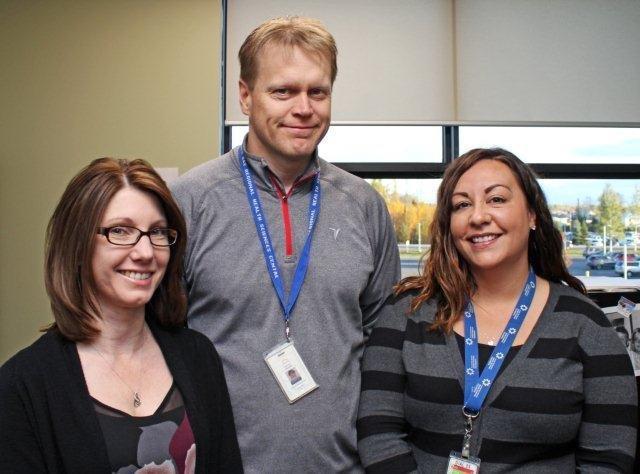Shared care clinic cited in prestigious American study
by Communications
 Part of the shared care mental health team at the Fort William Clinic, from left, Shannon Frizzell, administrative assistant, Dan Boudreau, social worker, and Tammy Ezowske, social worker. The shared mental health care service was initiated at the Fort William Clinic in 2001 by TBRHSC in partnership with St. Joseph’s Care Group and has been cited in a prestigious American publication as a best practice for showing dramatic results in reducing wait times for mental health services during its first three years of operation.
Part of the shared care mental health team at the Fort William Clinic, from left, Shannon Frizzell, administrative assistant, Dan Boudreau, social worker, and Tammy Ezowske, social worker. The shared mental health care service was initiated at the Fort William Clinic in 2001 by TBRHSC in partnership with St. Joseph’s Care Group and has been cited in a prestigious American publication as a best practice for showing dramatic results in reducing wait times for mental health services during its first three years of operation.
A shared mental health care service initiated at the Fort William Clinic in 2001 by Thunder Bay Regional Health Sciences Centre in partnership with St. Joseph’s Care Group has been cited in a prestigious American publication as a best practice for showing dramatic results in reducing wait times for mental health services during its first three years of operation.
The Institute of Medicine (one of four U.S. agencies comprising The National Academies, which are seen as advisers to the nation on Science, Engineering and Medicine) published Transforming Health Care Scheduling and Access: Getting to Now last June.
In a previous study, the Institute identified timely care as one of the six fundamental aims for health care, the others being that it be safe, effective, patient-centred, efficient and equitable. Acknowledging that timeliness is in some ways the least well studied and understood of the six aims, this newer study aimed to examine how timely care can be ensured in various health care settings and what are some of the reasons that care is sometimes not timely.
One of the suggested methods to improve timeliness is team-based approaches. And in its study of best practices using that approach, the Institute cites the Shared Care service located at the Fort William Clinic in 2001 to work with the primary care doctors employed there at the time.
The service located two mental health social workers and a psychiatrist at the clinic.
Primary care physicians referred patients to the mental health services, where the counselors triaged patients to either counseling or psychiatry services, the Institute reported.
By 2004, the report continues, the implementation of the team-based approach yielded dramatic improvements.
“Before the establishment of the shared care clinic, the median wait time for mental health care was 97.6 days. For the three years after the shared care clinic was established, the median wait time for shared care was just over 30 days, while the median wait time across non-shared care sites was more than 80 days,” it states.
While the clinic has grown dramatically over the past decade and is now located in a new medical building
off of Golf Links Road, it continues to offer a shared team approach, with improved access compared to traditional outpatient services, in the less stigmatized setting of a primary care office. This success continues even in the face of increases in referral/assessment and has not led to an increase in a burden on other mental health providers.
Seeing the success at this clinic, five other primary care clinics in the area have adopted a similar model.
“There is no doubt this has been a success,” said Dr. Peter Voros, director of Adult and Forensic Mental Health at TBRHSC. “It was particularly successful in those early days and still continues to yield improved services to patients requiring mental health services at that clinic. Like any of our operations, this is largely a credit to the talented and dedicated team of professionals we have working there. There was a clear vision early on, they did the work and it is gratifying to see that work acknowledged by such respected bodies.”
Dr. Jack Haggarty, the psychiatrist at the clinic, Senior Medical Director for SJCG, and co-author of the papers related to the research cited, agrees that such models of care can greatly enhance access when support to hard working primary care providers and counsellors is timely in providing the knowledge required to treat those with mental illness.